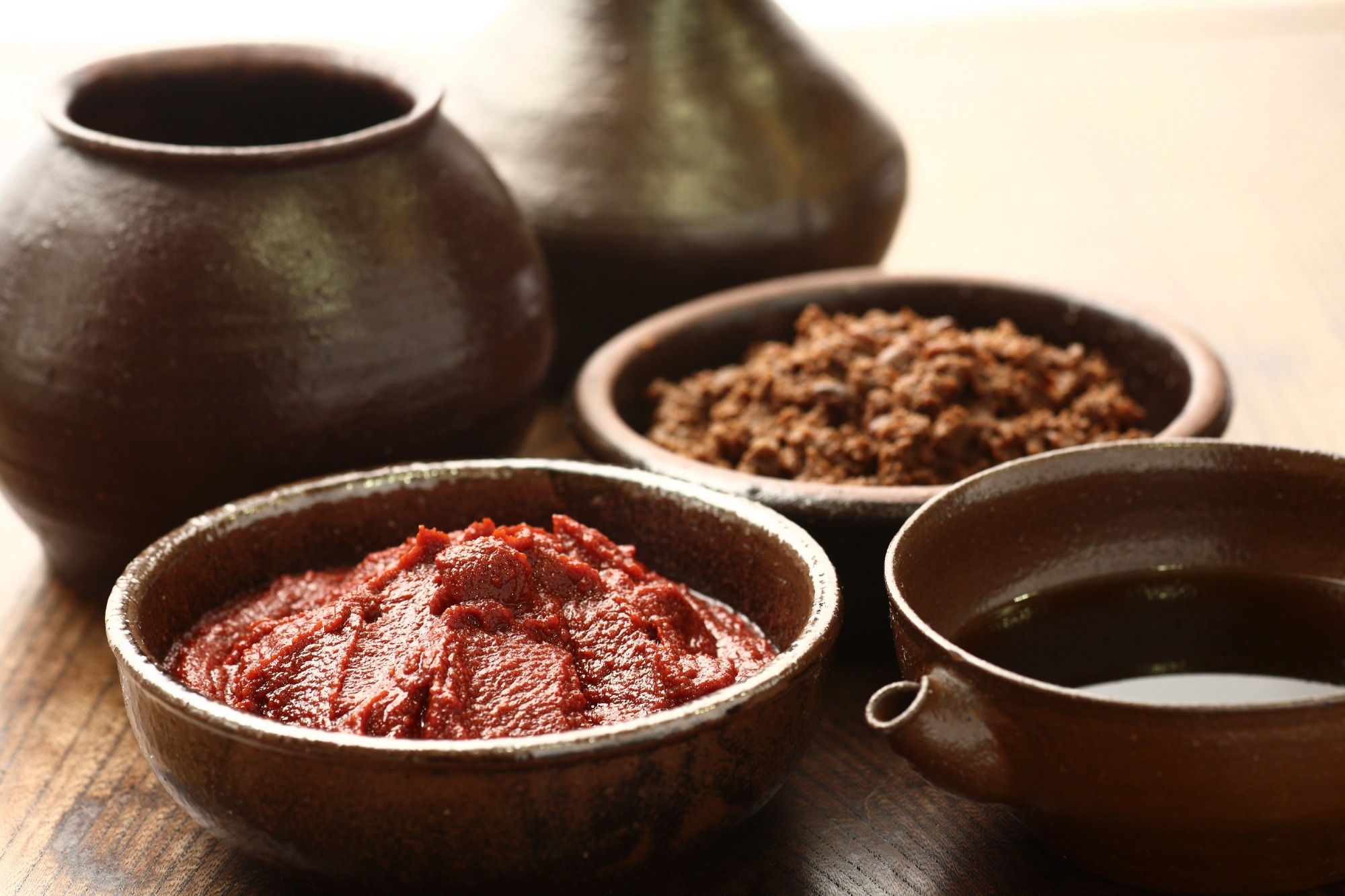In a recent study published in the journal Nutrients, researchers compare the efficacy between traditional and commercial Doenjang in alleviating menopausal syndrome.
Study: Evaluation of menopausal syndrome relief and anti-obesity efficacy of the Korean fermented food doenjang: a randomized, double-blind clinical trial. Image Credit: mino choi / Shutterstock.com
Treating menopause
Menopause leads to hormonal changes that may cause psychological and physical symptoms like hot flashes, sleep disturbances, insomnia, sweating, atrophy of the genitourinary system, and anxiety. Menopausal symptoms are often treated with hormone replacement therapy (HRT), primarily progesterone and estrogen.
Soy consumption, especially in Asian countries, is associated with lower rates of menopausal symptoms, thereby offering a natural substitute for HRT when it may be contraindicated or otherwise undesirable due to possible side effects such as breast cancer or cardiovascular disease.
Doenjang, a form of soybean paste consumed in Korea, is rich in antioxidants and fermented with beneficial microorganisms like Bacillus subtilis, Aspergillus oryzae, Rhizopus, and Mucor. Previously, Doenjang has been identified as a potential solution for alleviating menopausal symptoms; however, careful evaluation is needed to identify formulations that may be most effective for this purpose.
About the study
In the current study, researchers conducted an eight-week randomized and double-blind clinical trial involving postmenopausal women with menopausal syndrome.
The Kupperman index is a widely accepted diagnostic tool for menopausal syndrome that measures a wide range of vasomotor, urinary tract, psychoneurological, motor, digestive, and systemic symptoms. Scores below 20 indicate mild symptoms, while those between 20 and 40 signify moderate severity. Scores exceeding 40 indicate severe symptoms and scores of 60 or more denote a particularly severe manifestation of the syndrome.
Participants received Doenjang supplementation in three forms, including high-content beneficial microorganism traditional Doenjang (HDC), low-content beneficial microorganism traditional Doenjang (LDC), and commercially available Doenjang (CD).
Medication compliance, vital signs, and side effects were evaluated after four weeks of supplementation. Researchers collected measures of menopausal syndrome relief, including the Kupperman index, at the beginning and end of the trial, along with bioelectrical impedance analysis (BIA) results, weight, lipid profiles, serum blood markers, and inflammatory markers.
Safety assessments included blood chemistry, hematological tests, and monitoring for side effects. Obesity indicators and inflammation markers were also assessed, as were changes in the gut microbiome analyzed through stool tests.
Doenjang pills were prepared through a traditional fermentation process and freeze-dried for clinical trials. Statistical analysis included chi-square tests, analysis of variance (ANOVA), and paired t-tests to compare baseline and post-intervention data.
Study findings
A total of 56 individuals were included in the study and received HDC, LDC, or CD, none of whom reported any adverse events. Anthropometric parameters, including age, weight, and body mass index (BMI), did not differ significantly among the study participants.
Safety assessments indicated no adverse effects on liver or kidney function, with some improvements in blood urea nitrogen (BUN), uric acid, and total protein levels in the HDC group. Doenjang was not associated with anti-obesity effects; however, its use reduced LDL cholesterol levels.
Kupperman index scores significantly decreased in all groups following the administration of Doenjang, with improvements observed in various symptoms. Microbiome analysis showed decreased Firmicutes and increased Bacteroidetes across all groups, with beneficial bacteria increasing and harmful bacteria decreasing, particularly in the CD group.
Short-chain fatty acid analysis indicated varied effects across groups. Overall, while Doenjang showed promise in alleviating menopausal symptoms and modifying gut microbiota, its effects on obesity and inflammation were limited.
Conclusions
Traditional Doenjang fermented with beneficial microorganisms was found to be superior in its ability to mitigate menopausal symptoms as compared to commercial Doenjang. Nevertheless, a significant reduction in Kupperman index scores was observed across all groups, with the most notable improvement observed in LDC recipients.
LDL cholesterol levels decreased in both traditional Doenjang groups, thus indicating its potential cardiovascular benefits. Although Doenjang was not associated with anti-obesity or anti-inflammatory effects, its treatment positively influenced gut microbiota by increasing beneficial bacteria and reducing the levels of harmful bacteria.
Taken together, these findings demonstrate that traditional Doenjang has the potential to effectively alleviate menopausal symptoms, particularly when considering cardiovascular health, with implications for improving intestinal health through its impact on gut microbiota.
Some limitations of the current study include the inability to control participants’ lifestyle factors, the short study duration, and the small sample size. Thus, future studies with larger samples and longer durations to elucidate the therapeutic potential of Doenjang.
Journal reference:
- Han, A.L., Ryu, M.S., Yang, H., et al. (2024). Evaluation of menopausal syndrome relief and anti-obesity efficacy of the Korean fermented food doenjang: a randomized, double-blind clinical trial. Nutrients. doi:10.3390/nu16081194








